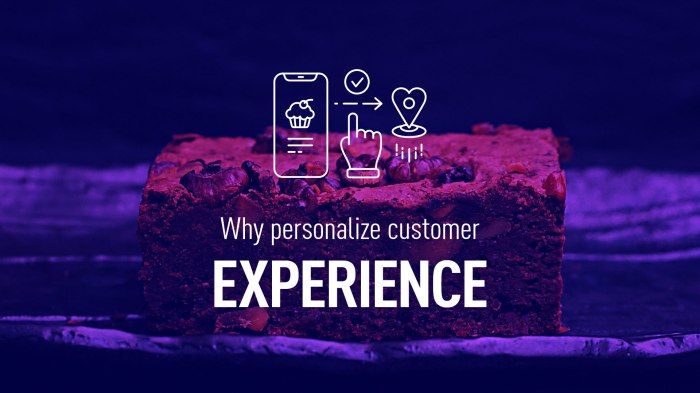Personalizing Customer Experiences sets the stage for businesses to truly connect with their customers on a deeper level, fostering loyalty and satisfaction. Dive into the world of tailored interactions and discover how companies are making it happen.
Explore the various strategies, benefits, and challenges associated with providing personalized customer experiences in today’s competitive market.
Importance of Personalizing Customer Experiences
Personalizing customer experiences is crucial for businesses in today’s competitive market. By tailoring interactions to meet the specific needs and preferences of each customer, companies can create a more meaningful and engaging relationship with their target audience. This personalized approach not only enhances customer satisfaction but also increases brand loyalty and retention rates.
Examples of Companies Excelling in Personalized Customer Interactions
- Amazon: The e-commerce giant uses data analytics to recommend products based on customer browsing and purchase history, creating a personalized shopping experience.
- Netflix: By analyzing viewing habits and ratings, Netflix offers personalized movie and TV show recommendations to improve user engagement.
- Spotify: The music streaming service curates personalized playlists for users based on their listening history and preferences, enhancing the overall music discovery experience.
Impact of Personalized Experiences on Customer Loyalty and Retention
Personalized experiences play a significant role in building customer loyalty and increasing retention rates. When customers feel understood and valued by a brand, they are more likely to return for future purchases and recommend the company to others. By establishing a strong emotional connection through personalized interactions, businesses can create long-lasting relationships with their customers, ultimately leading to sustained growth and success.
Strategies for Implementing Personalization
Implementing personalization in customer experiences involves various strategies to collect customer data, tailor experiences, and utilize technology effectively.
Different Methods for Collecting Customer Data for Personalization, Personalizing Customer Experiences
When it comes to personalizing customer experiences, businesses can utilize various methods to collect valuable customer data. Some common strategies include:
- Utilizing customer surveys and feedback forms to gather preferences and insights directly from customers.
- Tracking customer behavior on websites and applications through analytics tools to understand their interests and browsing patterns.
- Implementing loyalty programs to incentivize customers to share more information about themselves in exchange for rewards.
- Utilizing social media listening tools to monitor and analyze customer conversations and interactions for valuable insights.
Best Practices for Utilizing Customer Data to Tailor Experiences
To effectively tailor customer experiences based on collected data, businesses should consider the following best practices:
- Segmenting customers based on their preferences, behaviors, and demographics to create personalized marketing campaigns and offers.
- Using dynamic content on websites and emails to deliver personalized recommendations and messages to customers based on their interests.
- Implementing A/B testing to optimize personalized experiences and determine the most effective strategies for different customer segments.
- Ensuring data privacy and security by obtaining consent from customers to use their data for personalization and complying with relevant regulations.
Role of AI and Machine Learning in Automating Personalized Customer Experiences
AI and machine learning play a crucial role in automating personalized customer experiences by:
- Utilizing algorithms to analyze large volumes of customer data and predict individual preferences and behaviors.
- Automating the delivery of personalized content, product recommendations, and marketing messages based on real-time data and customer interactions.
- Enabling chatbots and virtual assistants to provide personalized customer support and recommendations through natural language processing.
- Continuously learning and adapting to customer feedback and behavior to optimize personalized experiences and improve customer satisfaction.
Benefits of Personalization for Customers: Personalizing Customer Experiences

Personalization plays a crucial role in enhancing customer satisfaction by tailoring products and services to individual preferences and needs. This level of customization creates a more meaningful and engaging experience for customers, ultimately leading to higher levels of satisfaction and loyalty.
Enhancing Customer Satisfaction
Personalized experiences make customers feel valued and understood, as businesses demonstrate a genuine interest in meeting their specific needs. By catering to individual preferences, customers are more likely to feel satisfied with their interactions with a company, leading to increased loyalty and repeat business.
Creating a Seamless Customer Journey
Personalization helps create a seamless customer journey by providing consistent and relevant experiences across various touchpoints. By leveraging customer data and preferences, businesses can ensure that interactions are cohesive and tailored to each individual, leading to a more cohesive and engaging customer journey.
Impact of Personalized Recommendations on Customer Decision-Making
Personalized recommendations have a significant impact on customer decision-making by guiding individuals towards products and services that align with their interests and preferences. By offering personalized suggestions, businesses can help customers make more informed decisions, leading to higher satisfaction levels and increased likelihood of purchase.
Challenges in Personalizing Customer Experiences

When it comes to personalizing customer experiences, businesses often face various obstacles that can hinder the effectiveness of their strategies. From data privacy concerns to the difficulty of delivering consistent personalized experiences, these challenges require careful consideration and innovative solutions.
Importance of Data Privacy and Security
In the realm of personalized customer interactions, data privacy and security play a crucial role. Customers are increasingly concerned about how their personal information is being used and shared by businesses. It is essential for companies to prioritize data protection measures to build trust with their customers and ensure compliance with regulations such as GDPR and CCPA. Implementing robust data security protocols and transparent privacy policies can help businesses navigate this challenge successfully.
Strategies for Overcoming Challenges
To deliver consistent personalized experiences, businesses can adopt several strategies to overcome the challenges they face. One effective approach is to leverage advanced technologies such as artificial intelligence and machine learning to analyze customer data and provide tailored recommendations. Additionally, investing in employee training and development to enhance customer service skills can help ensure that personalized experiences are delivered seamlessly across all touchpoints. Collaboration between different departments within the organization, such as marketing, sales, and customer service, is also essential to create a unified approach to personalization.